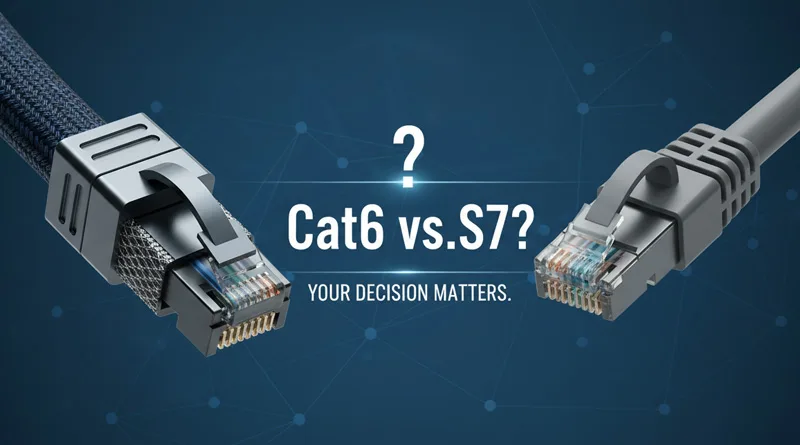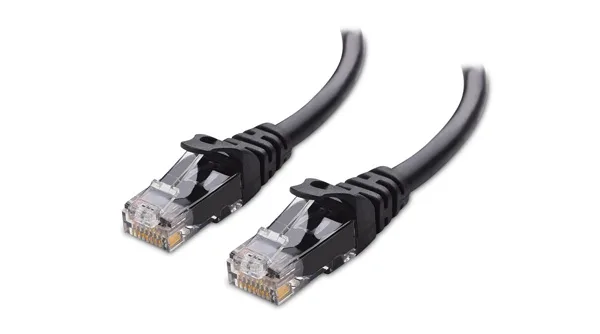You’ve learned that latency is your enemy, and that Wi-Fi is the biggest cause of inconsistent ping spikes. The solution is simple: go wired. But what is the best Ethernet cable for gaming? Navigating the world of “Category” ratings (Cat5e, Cat6, Cat7, Cat8) is confusing, and manufacturers often over-promise performance you don’t actually need.
This guide will demystify the specs, explain the true speed differences between the most common cables, and tell you which cable provides the most value for low-latency competitive play. The goal is to maximize your performance for minimal cost. For a full breakdown of why your connection needs this upgrade, see our guide on what is ping in gaming.
The Go-Wired Mandate: Why a Cable Beats Wi-Fi
Before discussing categories, it’s essential to understand why a cable is the single biggest upgrade you can make to your gaming experience.
Stability (Jitter)
Wi-Fi is a shared medium that constantly fluctuates due to interference from other devices, microwaves, and even your neighbor’s network. This causes jitter (spikes in latency) that ruin competitive gaming. An Ethernet cable is a dedicated, shielded channel that is immune to this interference, providing consistent, rock-solid latency.
Packet Loss
Wi-Fi is prone to packet loss, where small pieces of game data fail to reach the server, forcing a re-send and causing the frustrating “rubber-banding” effect. A high-quality best Ethernet cable for gaming essentially eliminates packet loss.
Cat5e vs Cat6 vs Cat7: The True Speed Comparison
The number in the cable name (Cat5e, Cat6, etc.) refers to its Category, which defines its specifications regarding bandwidth and maximum speed.
| Category (Cable) | Maximum Speed | Maximum Bandwidth | Best For |
| Cat5e (Standard) | 1 Gigabit/sec (1000 Mbps) | 100 MHz | Budget/Legacy Systems (Adequate for 95% of users) |
| Cat6 (Recommended) | 1 Gigabit/sec (1000 Mbps) | 250 MHz | The Gaming Sweet Spot. Better for crosstalk/interference. |
| Cat6a | 10 Gigabits/sec (10,000 Mbps) | 500 MHz | Office/Enterprise (Overkill for home use) |
| Cat7/7a & Cat8 | 10-40 Gigabits/sec | 600 – 2000 MHz | Data Centers. Marketing gimmick for home users. |
The Truth About Speed
For virtually every home internet user, Cat6 is the best Ethernet cable for gaming.
- Most home internet connections are under 1 Gigabit (1000 Mbps). Since Cat5e and Cat6 both support 1 Gigabit, you will see no speed benefit from moving to a Cat7 or Cat8 cable.
- Your router and modem are the ultimate speed bottleneck. Your cable will only be as fast as the slowest component in your network.
Why Cat6 is the Sweet Spot
Cat6 is superior to Cat5e because of its tighter wire twisting and thicker sheathing. This drastically reduces crosstalk (interference between the wires), leading to a cleaner signal, which translates to a more stable, consistent connection and, most importantly, lower jitter and latency than a cheaper Cat5e cable.
Buyer’s Checklist: Avoiding the Marketing Gimmicks
When buying the best Ethernet cable for gaming, ignore the high numbers (Cat7, Cat8) and focus on build quality.
1. Shielding (FTP vs. UTP): Protecting Your Best Ethernet Cable for Gaming
- UTP (Unshielded Twisted Pair): The most common type. Fine for home use.
- FTP/STP (Foiled/Shielded Twisted Pair): Includes an extra layer of foil or braiding around the wires. This is great for minimizing external interference, especially if your cable runs near power lines or electrical devices. For the best Ethernet cable for gaming in a cluttered setup, shielding is a smart choice.
2. Cable Length and Quality
- Length: Keep the cable as short as possible. While cables are rated for long runs, every unnecessary foot adds minuscule latency.
- Look for Stranded/Solid: Solid core cables (often cheaper) are stiff and not good for frequent movement. Stranded cables are more flexible and recommended for connecting a PC to a wall jack.
3. The Cat7 and Cat8 Trap
Do not buy Cat7 or Cat8 for home gaming. The increased shielding and bandwidth are unnecessary, and they are significantly more expensive and rigid. They exist for massive data centers running multiple 10Gbps connections, not a single PC running a 100Mbps game.
Conclusion: The Cheapest Performance Upgrade
The best Ethernet cable for gaming is a Cat6, or Cat6a cable. This choice provides the necessary shielding for low jitter and stable latency without spending extra money on unnecessary bandwidth. It is the single cheapest, most effective hardware upgrade you can make to your gaming setup.
Remember, a wired connection is only as good as the router it is plugged into. To fully eliminate lag spikes caused by network congestion, pair your new cable with a powerful router. See our full guide on which model is right for you: The Best Gaming Router of 2025.


